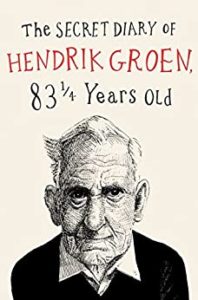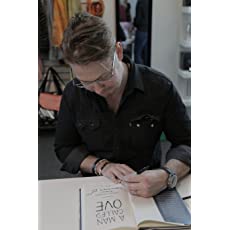A Review: The Secret Diary of Hendrik Groen, 83 1/4 years old, translated from Dutch by Hester Velmans, Grand Central Publishing 2017.
There is a growing genre of comic fiction about old folks. In 2014 Catharina Ingelman-Sundberg wrote The Little Old Lady Who Broke All the Rules. It was originally released in Sweden, but was translated and distributed worldwide, eventually becoming a bestseller in Canada and selling over one million copies. She had followed in a trail blazed by Jonas Jonasson whose book The Hundred Year Old Man Who Climbed Out of the Window and Disappeared sold over eight million copies. Fredrik Backman gained attention when his novel, A Man Called Ove, was translated from Swedish to English and distributed worldwide in 2016. Most recently Dutch  author Peter de Smet has captured a spot in the genre with The Secret Life of Hendrik Groen, 83 ¼ years old. After first holding a place for over thirty weeks on the bestseller list in the Netherlands, it has now been released in twenty-one other countries, along with its sequel On the Bright Side: The New Secret Diary of Hendrik Groen, 85 years old. Each of these authors has gotten rave reviews.
author Peter de Smet has captured a spot in the genre with The Secret Life of Hendrik Groen, 83 ¼ years old. After first holding a place for over thirty weeks on the bestseller list in the Netherlands, it has now been released in twenty-one other countries, along with its sequel On the Bright Side: The New Secret Diary of Hendrik Groen, 85 years old. Each of these authors has gotten rave reviews.
The authors are brilliant observers of ordinary people, but there is another key ingredient they all share. They make people laugh with impossible details and slapstick scenes about old people. What hundred year old man can climb out of a window? In a scene reminiscent of the sad clown in the circus taking a prat fall, Hendrik Groen tells of Mrs. Been, who fails to lock the wheels on her wheelchair, and when it tips over she falls onto a fully loaded tea cart. It may be funny when this happens in a circus, but it is a disaster in a nursing home. So hold the laughs. Backman recounts Ove punching out a clown in the waiting area of a hospital. The clown offers to entertain children by making a coin disappear, but uptight and stingy Ove, a man who has barely survived dire poverty, thinks the clown is trying to rob him.
These stories have a problem with cultural appropriation. When Oprah’s Book Club promoted Jeanine Cummins American Dirt, a story about migration, it caused a stir because Cummins was not part of the group whose story she was telling. It began a conversation about who gets to tell stories? What gives an author legitimacy? This is an important issue when victims of discrimination are portrayed in literature. It is also a fair questison when applied to portrayals of aging.
Stereotyping is a way of locking those from whom we want to be separate in the space of “the other.” Laughing at them might make the distance seem less brutal, but for the object of the put-down the shaming intensifies the insult. Portrayals of race, disability, gender, ethnicity, and alternate lifestyles have frequently been portrayed this way in stories. Values are changing. Blackface on stage isn’t funny. Lisping jokes about gay people aren’t either. And a president who mocks a man with a mobility impairment is totally out of line. Isn’t it time to add age to the list?

When Fredrik Backman wrote a story about Ove, the author himself was thirty-five years old. He created a troublesome old man, rigid in his ways, and full of self-pity about his losses. If Ove were your neighbor you wouldn’t be laughing, and if he were your grandfather, then shame on you for laughing. We laugh about our prejudices because we lack the intention to do anything about them. We might call this the “guffaw defense.” We use it to avoid having to look at tragedy squarely. What gives a young author legitimacy in writing about an older perseon if he crosses the line into stereotyping, disrespect, and bullying?
Peter de Smet was just over sixty when he wrote the story of Hendrik Groen, a character in his mid-eighties. What de Smet turns into humor is far from humorous for real older people. Hearing loss and visual decline are not comical, they are the stuff of daily humiliation for those who are isolated by these losses. Woven through his stories are comic images of older people using mobility devices ranging from canes to mini-cars. Getting around is a problem not a joke for many older people. The author stoops to calling aging men “old coots” and older women “biddies.” His name calling crosses the line into bullying.
One of the most painful scenes in Hendrik Groen’s story occurs at the bingo table when the number “44” is called. An elderly woman bursts out with the words “hunger winter.” In the winter of 1944 during the occupation of the Netherlands by Germany over four million citizens of large cities lived with drastic food shortages. Twenty-thousand died of starvation. Many ate cats, rats, and grass. Children went to bed night after night with the ache of hunger in their bellies. Is an older woman’s memory of this funny? Does she deserve to be reminded that younger people tire of hearing the same old stories? De Smet was born after the war. He did not live through “the hunger winter of 44.” Does he get to speak for those who did?
Humor directed toward those who are considered marginal carries with it an unspoken message of social expectations. When we laugh at older people for being old, we are also telling them that they should minimize their inconvenience to others, accept that their time of usefulness is past, remain silent about past events because we aren’t interested in hearing about them over and over and over again. In short, we are telling them to suck up their loss and step aside.
It is hard to talk with the young about aging, because they are trying to put off dealing with it as long as they can. Perhaps that is nature’s way. They have other important things to do at earlier stages of life. That which they hold at a distance will inevitably catch up with them, however, and sooner or later they too will die. If they are fortunate enough to put it off for a while they will get old along the way. The pain of that inevitable truth is what gets laughed away with “guffaw defenses.” Meanwhile through all the laughter we fail to ask what the value of growing old might be. Is it a wasted stage of life? To get a purchase on that we might have to stop laughing and ask someone seasoned with age.
I am not suggesting that authors give up writing fiction about older characters, but I am suggesting that when authors do write about them they not bully this age group. Older characters are interesting, but age-shaming isn’t funny. There are examples of authors who’ve gotten it right. In 2017 when Elizabeth Berg wrote The Story of Arthur Truluv, she herself was seventy years old. She understands the meaning of loss that comes with age. Her novel has depth that some of the others in the genre lack. She also understands that loss does not begin with age, and she creates a touching alliance between a colorful young woman and two older adults. Berg makes it clear that they need each other. Her writing mixes humor with compassion. It is not a mushy novel; it’s a respectful one. We might even call it “age appropriate.”
In 2017 when Elizabeth Berg wrote The Story of Arthur Truluv, she herself was seventy years old. She understands the meaning of loss that comes with age. Her novel has depth that some of the others in the genre lack. She also understands that loss does not begin with age, and she creates a touching alliance between a colorful young woman and two older adults. Berg makes it clear that they need each other. Her writing mixes humor with compassion. It is not a mushy novel; it’s a respectful one. We might even call it “age appropriate.”
July 4, 2022
I am 77 and thought the book was wonderful. I did not at any point in the book feel shamed and really enjoyed his birds eye view of the future.
July 16, 2022
I am 83 and I find no bullying comments at all. This book was written with humor. There is some sadness, but that is life. Any referrals to war time is what we lived through and maybe younger folks reading this would do well to learn their history. Totally loved both of these books and wish he would write more. This world could use a little more laughter today.
October 16, 2022
Agree 100%. I’m 76 and live in a retirement community in the US. Peter de Smet nailed it.
May 23, 2023
I am 82, my husband 83; we are fortunate to still live in our own home; stair lifts accommodate my husband’s increasing lack of mobility and enable my bad back to get groceries up the stairs and laundry both ways. We have a housekeeper twice a month, but I still cook meals, do the shopping and take care of many household issues. We are fortunate to have kind and helpful neighbors. For me, the book was many things: humorous, sad, frustrating and illuminating. I felt as though I knew many of the residents through my acquaintance with older adults; I recognized the bureaucracy because a very good friend is an ombudsman for a local nursing home; I cheered for the club members who found a way to change and to care for others. Henk reveals the inner conflicts and takes himself to task when he fails to be compassionate. As we age we become more fearful of what could happen to cut those few remaining years shorter. How we deal with aging is colored by our personal history. I think my laughter was tinged by recognition, not by setting myself apart or laughing at in a mean- spirited way. The author must know many older people to have captured the individual characteristics so well. I don’t see appropriation, I see it as storytelling for those who need a spokesperson. Humor can make a point as well as stark realism. The word Grace come to mind, something that we don’t always remember.
August 5, 2023
Beautifully said. I am 82 and greatly enjoyed the humor, friendships, and courage to live life fully until the end. Wonderful book.
August 26, 2023
I have to agree with Leslie. 100% I guess I’m wondering why you focused on Scandinavian authors? And chose to refer to those very books in chapter 2 of Broken Glass? It seemed quite a “jab”. Sounds a bit passive aggressive. I understand ageism (discrimination against the elderly in our society and healthcare,..etc.). At age 75, I’ve experienced my share. But, I didn’t see it in the books, in the context you are referring to. The Netherlands has been known for the best, most sensitive and respectful, elder care in the world. As they also do for people with disabilities. I would think, assuming you live in the U.S., you would be concerned and hypercritical of our lack of sensitivity and respect. “Let’s hide them all in institutional settings (for convenience sake) so they’re not making us uncomfortable.” (My daughter specializes in care and support for people with developmental and physical disabilities, on an international level. Also working as their human rights advocate) We’ve been referred to as “useless eaters” in this country. That should offend you more than works of fiction.